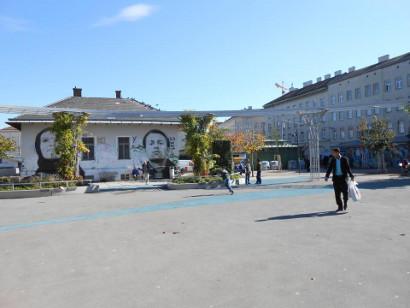Day 18, Year of #Mygration: Migrants, supporters and researchers as brokers

Written by Sara de Jong, who is co-lead of the Justice, Borders, Rights research stream and Research Fellow of the Strategic Research Area Citizenship & Governance. Please find her recent open access publication here: de Jong, S. and I. Ataç (2017) 'Demand and Deliver: Refugee Support Organisations in Austria' (Open Access), Social Inclusion, 5(3): 28-37.
"A colleague who recently heard me present my research on the role of migrant staff as brokers in migrant support and advocacy organisations, asked me if I didn’t understand myself as a kind of broker too. Wasn’t I as an academic (and migrant) also in the role of a conveyor and translator of different knowledges? On the 25th of January, I will be giving a presentation entitled ‘Brokering Knowledge in Research with Refugee and Migrant Case Workers’ as part of the University of Oxford COMPAS seminar series ‘Beyond Impact? Using, Exchanging, and Communicating Migration Knowledge and Research’. In my presentation, I will share some of the lessons that I learned from my imperfect attempts to create a dialogue with the communities that I studied.
In my research I have always been interested in people who try to ‘do good’ in this unjust world and the tensions that emerge when unequally situated people encounter one another. I once investigated the position of women in the global North seeking to support women from the global South. Some worked for local third sector projects with migrant women, others were employed by large international organisations operating in the global South. I was fortunate enough to find participants willing to share the challenges they faced in their work. Each of them were keen to read the project’s findings. Dutifully I sent them a report of a few pages when the project finished. The - much longer - book ‘Complicit Sisters: Gender and Women’s Issues North-South divides’ is out in the public domain. But who of my participants carved out the time to read this when they could instead fight for the rights of migrant sex workers or get women from Darfur around the peace negotiation table?
Determined to do better, my next project on the role of refugee, migrant and ethnic minority staff of migration support and advocacy organisations, involved a number of outreach activities, including an international workshop. On a hot summer day in Vienna, refugee case and migrant case workers from the UK, the Netherlands and Austria came together with managers, refugee community representatives, and teachers of social work. Challenging interview quotes in hand, participants discussed the validation of knowledge, professionalism and the relationship with service users. Together they developed ways in which migrant and refugee staff could become more effective and valued ‘brokers’ within their organisations.
Migrant staff members are often primarily viewed as capable of facilitating client contact and ‘translating’ the so-called host society to the service user. The concept of brokerage is useful in reminding us that knowledge should flow in (at least) two directions. The potential of migrant brokerage, namely the adaptation and re-evaluation of organisational and host society practices, should not be left untapped. Migrant staff’s experiential knowledge, developed from the experience of flight, loss, discrimination, adaptation, and navigation of new environments, is at least as relevant as linguistic or cultural competences.
Fortunately, the summer workshop led to ongoing conversations and spin-off events with some of the participants from the migration third sector. My presentation at the University of Oxford COMPAS seminar series ‘Beyond Impact? Using, Exchanging, and Communicating Migration Knowledge and Research’ will be followed by responses from two staff members from Asylum Welcome, an Oxford-based charity that participated in the earlier research project. Undoubtedly, their professional experience will challenge my academic thinking and the exchange hopefully makes all of us better brokers of migration research."
Quarterly Review of Research
Read our Quarterly Review of Research to learn about our latest quality academic output.

Contact our news team
For all out of hours enquiries, please telephone +44 (0)7901 515891
Contact details